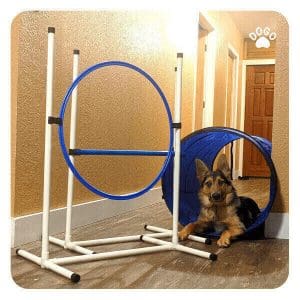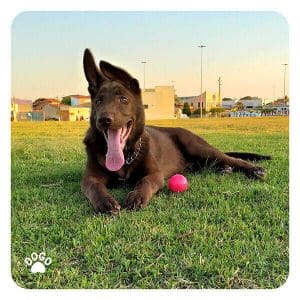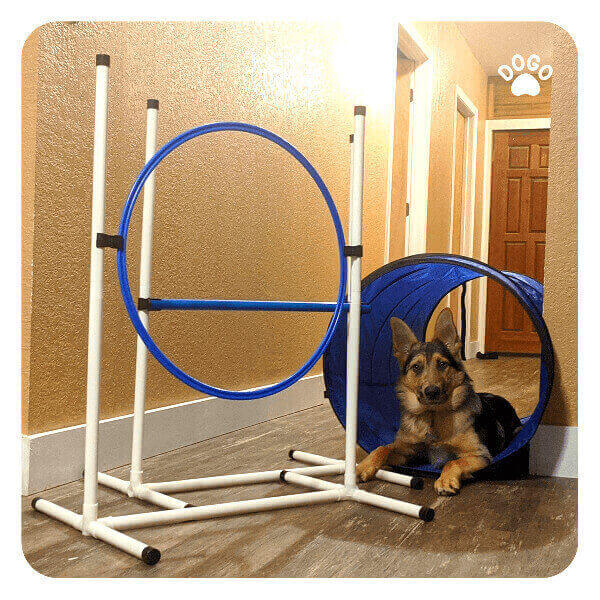 People usually associate dog training with treats. They are right because this is usually how positive training begins. For many dogs, this is the best form of motivation. However, you should be aware that not every dog will do everything for a cookie. This is where the problem begins for many dog parents. How to keep your dog motivated to train?
People usually associate dog training with treats. They are right because this is usually how positive training begins. For many dogs, this is the best form of motivation. However, you should be aware that not every dog will do everything for a cookie. This is where the problem begins for many dog parents. How to keep your dog motivated to train?
Types of rewards
There are two types of rewards: basic and conditioned. The basic prizes are those that the dog naturally desires because they satisfy their needs. This can be treats, playtime or petting. The conditioned reward will be a signal, which as a result of learning will be associated with food or fun. In training, this signal is often a clicker sound or praise, e.g. “good dog. By associating this sound with the reward, we can precisely communicate to the dog which behaviour is rewarded. This allows the dog to understand quickly what is expected of them. Therefore they will be rewarded more often and they will be eager to learn. This association should be reminded from time to time. In practice, it means that after the signal you should always or almost always reward your dog. Otherwise, your pup will start ignoring the signal.
Dogo has a virtual clicker which will be helpful in your training. Nowadays, we almost always carry our phones, so you will be able to train your dog anywhere and anytime.
How to train a dog?
Training sessions should not be too long. Each session should finish with your dog’s success. If we drag the exercises, finish them when our dog doesn’t want to practice anymore or they are failing, they will be discouraged to train again. Sometimes it’s even better to take a step back and at the end of the training session, ask your dog for a command that they know well. So that your dog is happy that they succeeded.
In addition to keeping training sessions short and ending on a positive note, it’s important to maintain a consistent training schedule. This helps your dog develop good habits and reinforces what they’ve learned. Depending on your dog’s age and energy level, you may need to adjust the frequency and duration of training sessions. Puppies, for example, may need shorter, more frequent training sessions, while older dogs may require longer, less frequent sessions. It’s also important to remember that training is an ongoing process. Even after your dog has learned a new behavior, it’s important to continue practicing and reinforcing it regularly to ensure it becomes a habit.
Motivating your dog is crucial for effective training. While treats can be a great motivator for many dogs, it’s important to understand that not all dogs are food-motivated. Some dogs may prefer other forms of rewards, such as playtime, toys, or even verbal praise. As a dog owner, it’s important to experiment with different types of rewards to find out what works best for your furry friend. Additionally, some dogs may need a little extra encouragement to get motivated. In these cases, it can be helpful to break down training sessions into smaller, more manageable tasks. This can help your dog feel more accomplished and motivated to continue with the training.
Rewarding with treats
Tasty treats are the most common way to motivate. They are perfect for learning obedience because you can deliver them fast. The treats should be not larger than one bite so you can keep on training without pause. Treats are also a good reward in the resocialization of hyperactive pets as they tend to calm them down.
However, remember not to show your dog the reward before or during giving the command, but only after the exercise. If we show the reward to the dog, then they will learn that it is only worth following the commands if we have the reward with us. Showing the food before giving a verbal cue is only allowed at the initial stage of training.
Depending on the difficulty of the task, it is worth having treats of a different value from dry kibble to super tasty ham. After all, the more difficult task, the better treat!
Rewarding with fun together
 If our dog is not a binge eater, you can’t always get them to perform for treats. Try to reward them with a little fun instead. This way is slightly more difficult. It also extends the time of training, because initially after every well-done task we have to spend some time playing.
If our dog is not a binge eater, you can’t always get them to perform for treats. Try to reward them with a little fun instead. This way is slightly more difficult. It also extends the time of training, because initially after every well-done task we have to spend some time playing.
Rewarding with their favourite toy
A toy as a reward is very often used in agility to speed up tasks (ball throw) and in defense where playing tug with the dog is the best motivation for dogs practicing this sport. When rewarding with a toy, it is necessary that the dog knows how to give it back on command. You will find the command in the Dogo App.
Other forms of motivation
You don’t always have to reward your dog with treats. This is only where training begins but behaviours that have already been learned with treats should be rewarded in another way as soon as possible.
For some dogs, a great reward will be their human’s joy. Sometimes it is enough to praise or offer petting. At later stages of training, you should randomize the rewards so that your dog does not learn that they will always get the reward for every command they perform.
There is another form of reward that can be used on a daily basis – “situational rewards”. When our dog is impatiently waiting for a bowl of food, try asking them to perform a trick before giving them the meal. In this case, the reward will be their food. When the dog can’t wait to be released from the leash during the walk, try to ask them for ”Heel” command. The chance to run free will be a great reward, and as we know, things you worked for, bring more joy.
Individual approach
There are plenty of possibilities to motivate your dog for training. You just need to realize what your pet likes the most, and then there will be certainly no problem with motivation. Dogs are used to work with humans so it’s usually fun for them to solve tasks and learn new things. The key to success is an individual approach. Every dog is different and will be motivated by something else. Take time to get to know your dog and enjoy training together.
[/fusion_text]



